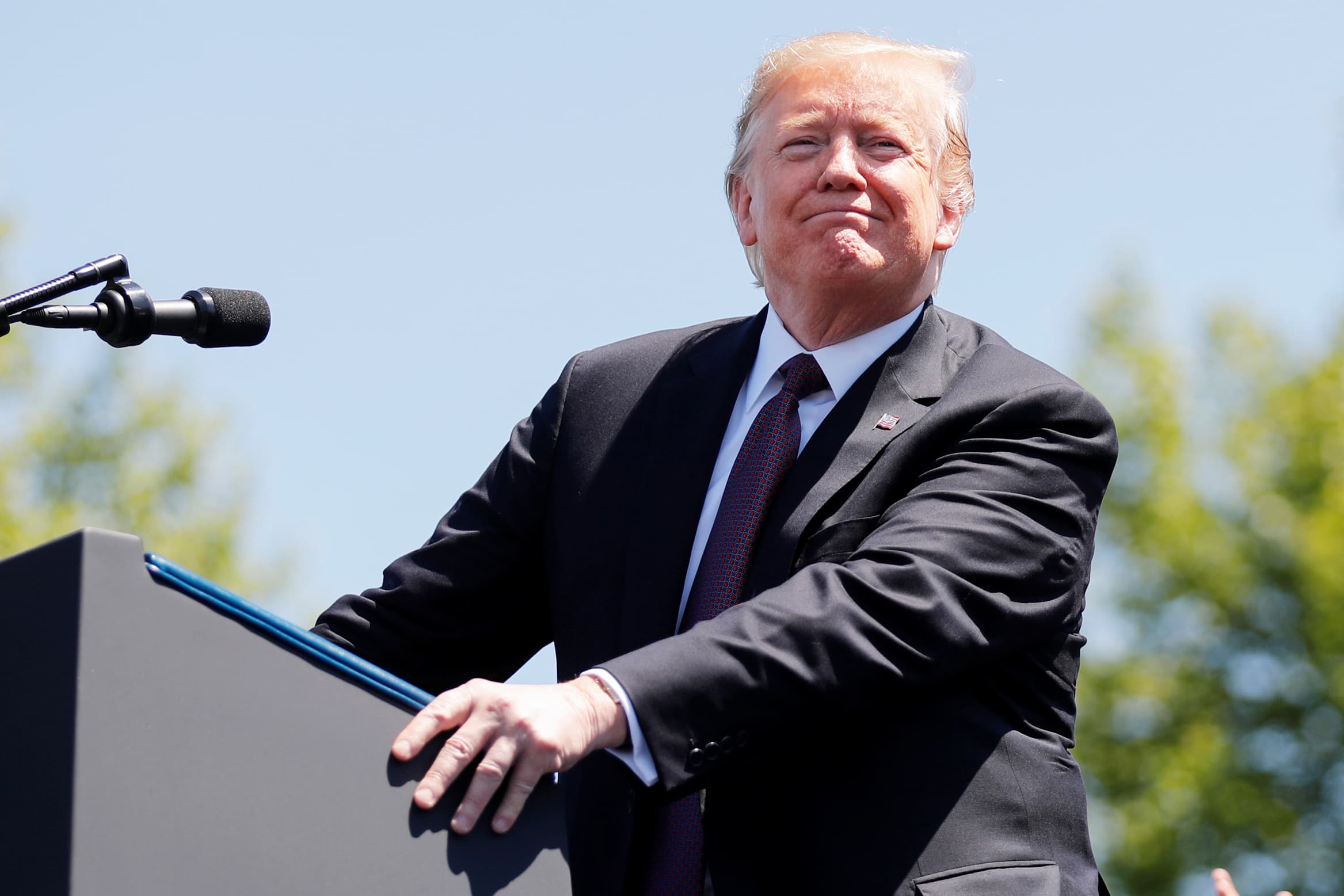
President Donald Trump speaks at the 38th Annual National Peace Officers Memorial Service on Capitol Hill in Washington, May 15, 2019.
Carlos Barria | Reuters
When it comes to his position on the U.S.-China trade dispute, President Donald Trump is still playing the role of a riverboat gambler on a hot streak.
Nearly a year ago, Trump was pressed, during a CNBC interview, to explain his aggressive tariff strategy both against China and other partners around the world. The S&P 500 was up nearly 5% for the year as of the July 20 appearance, and the large-cap index had risen 31% since his election victory in 2016.
"This is the time. You know the expression, 'we're playing with the bank's money,'" he said.
The expression is actually "playing with the house money" and is a gambling metaphor for someone wagering with their winnings and thus not having as much to lose.
Some 10 months later, and the president's gambit is still backed up by a solid stock market that's gained about 42% since the election and an economy that gives him the leeway to keep pressing his case for a more level playing field.
"There's house money here. The [U.S.] market is at virtually all-time highs, interest rates are low with very little inflation, and the whole world is investing in the United States as the safe-haven equity trade," said Michael Yoshikami, CEO and founder of Destination Wealth Management. "So that's a pretty strong position to be in."
'Their own version of the financial crisis'
Yoshikami's firm is based in San Francisco and he travels frequently to China to meet with clients.
What he's seen over the past year is a nation on edge, worried about its growth potential as it switches from an export-driven economy to one that has better balance due to stronger consumption. With that backdrop, Trump would seem to have plenty of chips and a strong hand to play.
Still, nerves are jangled on Wall Street. Market participants worry that escalation in the tit-for-tat tariff battle could dent business and consumer confidence and lead to a prolonged slowdown.
But Yoshikami asserts that China has more to sweat than the U.S.
"China really needs a deal. The economy is having a real issue," he said. "If you talk to people in China, things are slowing down and the population knows it."
Indeed, data released Wednesday showed that retail sales growth in China hit a 16-year low and industrial production was well below consensus estimates. GDP growth is about half what it was during its peak and real estate prices are plummeting.
"What people fail to realize is what's happening in the trade situation is their own version of the financial crisis that we had in 2008," Yoshikami said. "The president knows that."
Playing the Fed ace
But what Yoshikami thinks may be the real ace in the hole for the U.S. is the Federal Reserve, which has put policy changes on hold for the rest of the year. Traders, in fact, see a strong chance that the central bank will cut its benchmark interest rate before 2019 is up.
"That's actually the house money that's being utilized," he said. "Even though there's lots of drama going on with China, the administration figures they always have the Federal Reserve, as well as the bully pulpit, to stabilize the market."
At the retail level, though, investors remain on edge that the continuing saber-rattling is destabilizing.
As tensions have ramped up over the past week, investors have pulled nearly $7 billion from the SPDR S&P 500 Trust, the most popular ETF for playing the large-cap index. Equity ETFs and mutual funds have seen $116 billion in outflows in 2019 even with the sizable gains stocks have seen, according to Bank of America Merrill Lynch
"He risks pushing this too hard," Mitchell Goldberg, president of ClientFirst Strategy, said of Trump's trade posture. "This whole fight is about long-term gain for short-term pain. Trump has that on his side."
Goldberg doesn't sense any panic among his clientele, but he also doesn't see a lot of interest in adding to existing allocations.
"The money in the market is staying there," he said. "But it's new money that's not getting off the sideline."
No comments:
Post a Comment